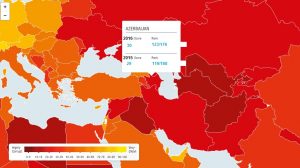Corruption Perceptions Index (CPI) 2016
Posted by: admin | Posted on: Январь 25, 2017 Transparency International’s National Chapter in Azerbaijan presents the TI Corruption Perceptions Index 2016. This year Azerbaijan received a score of 30, and was ranked 123th out of 176 countries. The CPI 2016 ranks countries in terms of the degree to which corruption is perceived to exist in the public sector. The ranking is based on a scale of 0 to 100 with 0 being very corrupt and 100 being very clean. It is thus a country’s score rather than its rank that allows comparing developments in a country over time. In 2015 Azerbaijan was ranked 119th among 168 countries with the score of 29. Azerbaijan’s score in this year’s CPI went up by one point from the previous year. Overall 13 data sources were used to construct CPI 2016. These reports measure a country’s status on a number of political, economic and social indicators bearing on the effectiveness of the country’s anti-corruption policies. The data for Azerbaijan is drawn from 7 different sources. Full list of sources is given in the Frequently Asked Questions.
Transparency International’s National Chapter in Azerbaijan presents the TI Corruption Perceptions Index 2016. This year Azerbaijan received a score of 30, and was ranked 123th out of 176 countries. The CPI 2016 ranks countries in terms of the degree to which corruption is perceived to exist in the public sector. The ranking is based on a scale of 0 to 100 with 0 being very corrupt and 100 being very clean. It is thus a country’s score rather than its rank that allows comparing developments in a country over time. In 2015 Azerbaijan was ranked 119th among 168 countries with the score of 29. Azerbaijan’s score in this year’s CPI went up by one point from the previous year. Overall 13 data sources were used to construct CPI 2016. These reports measure a country’s status on a number of political, economic and social indicators bearing on the effectiveness of the country’s anti-corruption policies. The data for Azerbaijan is drawn from 7 different sources. Full list of sources is given in the Frequently Asked Questions.
Government reforms to increase efficiency and accountability of public services made a positive impact in terms of improving Azerbaijan’s overall position in CPI 2016. Though the government took steps in 2016 to address a number of problems hindering businesses, including the ones creating risks of corruption, it is essential that the scope of the reforms in this area be extended. Reforms in the economic sphere also positively contributed to the country’s position on CPI, but for the country’s place on the Index to further advance, there is a need to expand reforms in two areas of good governance – democracy and rule of law. Embracing a transparent and accountable fiscal policy would go a long way towards improving the government’s anti-corruption policies and thereby helping its status to improve on CPI.
A snapshot of progress and challenges in Azerbaijan’s fight against corruption in 2016
Azerbaijan has made considerable progress in tackling corruption in public services in recent years. ASAN service, a one-stop shop public agency, streamlined delivery of 112 public services by further strengthening its high-performance service management. The agency has also introduced competition among public agencies that resulted in better management policy and practice focusing on customer satisfaction. In parallel, the government has further upgraded the quantity and quality of e-services, which has brought down the contact between officials and customers.
One of the most important reforms in the fight against corruption last year was the state’s providing protection for whistleblowers. The change introduced the rules for presenting information on corruption violations and taking action to provide for the protection of the whistleblower. Another positive step was the government’s adoption of Open Government Initiative National Action Plan for 2016-2018. A successful implementation of the Plan may create better conditions for strengthening public participation, transparency and accountability.
In 2016, a number of problems remained unaddressed. The income declaration forms for public officials have not been designed, and as a result, the provision of the “Law on combating corruption” about the financial reporting by public officials remained unimplemented. The draft law on prevention of conflict of interest in the work of public officials is ready, but is yet to be adopted. Though there is a registry of commercial entities, the fact that some vital information concerning these entities is considered a commercial secret casts a shadow over transparency in business environment. A lack of transparency and accountability in public procurement may create ground for corruption-related violations in this area. The measures taken after the liquidation of the State Procurement Agency with regards to the public procurement legislation have not been consulted with stakeholders – businesses and civil society institutions.
It is important that transparency of the allocation and use of public funds be further increased. Stakeholders should be more often engaged in the debating of state budget in the legislature, and public oversight of the use of public funds should be strengthened. The competences of the Chamber of Accounts should be expanded and its role in holding public agencies to account for their spending of public funds should be increased.
Though there has been a political will to simplify grant regulations, legislation should be further improved in this area. The efforts should be continued to remove legal and bureaucratic obstacles to the functioning of the civil society.
The display of political will by the Azerbaijan Government to curb corruption leaves room for optimism, as this is an indispensable prerequisite for effectiveness of reform efforts. Another substantial ingredient in the struggle against corruption is the cooperation among all relevant stakeholders. In this regard it is vital that the environment for the civil society be improved. Corruption Perceptions Index 2016 Global results.

.jpg)
.jpg)
.jpg)
.jpg)
.jpg)
.jpg)
.jpg)
.jpg)
.jpg)
.jpg)
.jpg)
.jpg)
 D5 Creation
D5 Creation
Comments are Closed